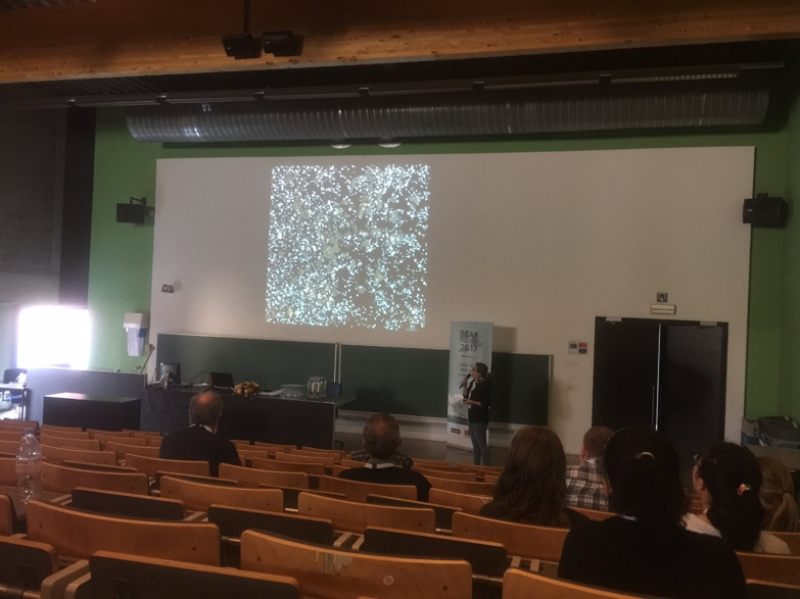SCAR Biology Symposium: Belgium
Leyre Villota Nieva
Bangor University

The 2017 SCAR Biology Symposium (SCARBio17) in Leuven, Belgium was a busy and information packed 6 day conference, covering a diverse range of Antarctic Biology related topics such as “Understanding Physiology (incluiding ‘-omics’ approaches)”, “Astrobiology”, “Adaptation and processes in top predators” amongst others. This year there were panel presentations from top physiologists and ecologists, a one day early career workshop organised by APECS (Association of polar early career scientists) and several lunch time and evening meetings. I was fortunate enough not only to attend the conference, but also to give an oral presentation on my current PhD research at the Physiology and omics” theme and attend the mARS meeting (Microbial Antarctic Resource System). This was only possible because of the generous funding by the Challenger Society for Marine Science.
SCAR Biology is held once every four years alternating between several destinations in the world and is the only conference specific to Antarctic Biologists. This is the only time Antarctic Biologists come together to discuss the state of the art and it’s an ideal conference for early career scientists to meet other researchers in the field and practice feeling comfortable presenting to a larger audience. This was a very important conference for me to attend, since it would not happen again during the course of my PhD. The conference was very well attended, with teams coming from all over the world: from Chile to New Zealand amongst others. This was an invaluable experience, particularly because although we all worked on Antarctic Biology, it is not often that we get to meet each other in person and share our research.
My oral presentation was titled “Heating up the ocean: effects of in situ oceanic warming on marine benthic recruitment and community development” and focused on one chapter from my PhD thesis: the heat shock response and acclimation in Romanchella perieri, an Antarctic benthic worm. I generated much interest in the topic and received some positive feedback from the presentation.
Most valuable to me however, were the connections I made outside my normal UK Antarctic network. It was very exciting to finally meet researchers such as Chris Cheng from the University of Illinois (USA), who’s work I have studied very extensively but not had the opportunity to meet in person. She also attended my talk to my surprise! I walked away from the conference with new projects, new ideas and the satisfaction feeling of having presented part of my PhD research to such an experienced audience. Thank you again to the Challenger Society for Marine Science for providing me with the funding to attend this amazing conference.
Profile:
I am a third year PhD student at Bangor University and the British Antarctic Survey, studying the effects of in situ oceanic warming on marine benthic recruitment and community development in Antarctica. I am interested in understanding how organisms adapt to their environment. I look at how environmental stress affects organisms across many levels of biological organisation, from cellular to physiological responses and how this knowledge can help us predict future responses to climate change.
Latest News
Royal Society Publishing Photography Competition 2025
Please see a message from the Royal Society below:
We are delighted to announce that the 2025 Competition is now open for entries until 15 August for a chance to win £1000! The competition celebrates the power of photography in conveying the wonder of science happening all around us and photographs can be submitted in the categories of: Astronomy, Behaviour, Earth Science and Climatology, Ecology and Environmental Science, and Microimaging.
The competition is free to enter and open to anyone studying or working in science at graduate level or above. Category winners will receive a one-year membership to the Royal Photographic Society and the overall winner will receive a grand prize of £1,000. Find out more: https://bit.ly/RSPphotocomp
October 2025 MEDIN Workshop: Marine Data Management, Governance and the MEDIN toolset
The Marine Environmental Data and Information Network (MEDIN) are pleased to announce that registration is now open for the next occurrence of our popular free online training workshop: ‘Marine Data Management, Governance and the MEDIN toolset’ on the 13th – 17th October 2025 on OceanTeacher Global Academy.
Marine Data Management, Governance and the MEDIN toolset
The Marine Environmental Data and Information Network (MEDIN) and OceanWise are delighted to invite you to attend our popular free online training workshop: ‘Marine Data Management, Governance and the MEDIN toolset’ on the 19th – 23rd of May 2025.
